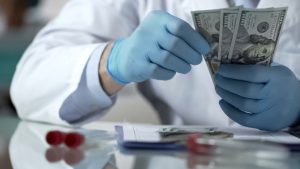 A former billing manager brought the misconduct to the attention of the Justice Department by filing a False Claims Act lawsuit.
A former billing manager brought the misconduct to the attention of the Justice Department by filing a False Claims Act lawsuit.
Medical-testing firm Genotox Laboratories of Austin, Texas has agreed to pay $5.9 million to resolve allegations it violated the Anti-Kickback Statute and False Claims Act by paying volume-based commissions to independent sales representatives and specimen collectors.
According to the U.S. Department of Justice, Genotox compensated sales representatives—whom it referred to as 1099 contractors in reference to their self-employment status under the U.S. Tax Code—based on a percentage of the revenues they generated, including from federal health care programs such as Medicare and Tricare.
Those payments violated the Anti-Kickback Statute or AKS, the government alleged, causing the claims for payment to those federal healthcare programs to be fraudulent under the False Claims Act.
A former Genotox billing manager alerted the Justice Department to the fraud by filing a False Claims Act lawsuit. He received a $1 million whistleblower award from the settlement proceeds.
Illegal revenue-based commissions
Genotox provides drug testing services for pain management centers, family and internal medicine practices, psychiatrists, addiction treatment centers and OB/GYN practices, according to its website.
The company improperly paid the sales representatives, who marketed Genotox’s services to providers, laboratories, and patients throughout the United States, commissions based on the number of samples or the revenue they generated, the whistleblower alleged.
The lab testing firm also allegedly engaged independent contractors it referred to as “specimen collectors”, “specimen processors”, or “SPs”, who typically worked within medical practices and who collected and processed urine samples for urine drug tests or UDTs and routed them to Genotox. They too, like the sales representatives, were improperly compensated based on the number of lab tests or revenue they generated, according to the whistleblower’s qui tam complaint.
Genotox also improperly billed federal healthcare programs for drug tests that were not covered or which were not medically necessary, according to the settlement with the Justice Department. Those tests allegedly resulted from improper “blanket” or “standing” UDT orders.
Specifically, Genotox offered medical providers the option of ordering blanket lab tests for all their patients using an electronic form called a “custom profile”, it admitted. This allegedly resulted in UDT tests being performed on nearly all the patients of the medical practices involved, generally at the highest reimbursement categories, according to the government.
With the settlement, Genotox also entered into a deferred prosecution agreement with the Justice Department resolving a criminal probe into its alleged misconduct.
The AKS and False Claims Act
The AKS prohibits parties from giving or receiving any improper renumeration—which is broadly interpreted by courts to include anything of value—either directly or indirectly, to induce a healthcare provider to order or recommend a product or service paid for by a federal healthcare program. It aims to ensure that patients are able to rely on healthcare providers exercising their medical judgment without being influenced by improper financial considerations.
Claims for payment to federal healthcare programs that resulted from AKS violations are legally false and fraudulent under the False Claims Act, which imposes significant liability on parties who knowingly overcharge or underpay the federal government or its agencies. The False Claims Act’s qui tam provisions enable whistleblowers—known as qui tam relators—to sue on the government’s behalf and receive 15-30% of the lawsuit’s proceeds as a reward.
Speak with a whistleblower attorney
If you know of parties paying or receiving illegal kickbacks in violation of the AKS or otherwise defrauding a federal healthcare program or other federal agency, it is important to speak with an experienced whistleblower attorney about your rights under the False Claims Act.
Reach out to healthcare fraud whistleblower attorney Mark A. Strauss for a free consultation. All communications with Mr. Strauss are subject to the attorney-client privilege and strictly confidential.
Whistleblower lawsuits are complex matters requiring an experienced attorney to help protect your interests and maximize your whistleblower award.
To be eligible for a False Claims Act whistleblower award, you must file a qui tam lawsuit. Simply reporting wrongdoing directly to a government agency by means of a tipline, email, or otherwise will not entitle you to qui tam whistleblower recovery.
 The Whistleblower & Anti-Fraud Blog
The Whistleblower & Anti-Fraud Blog

